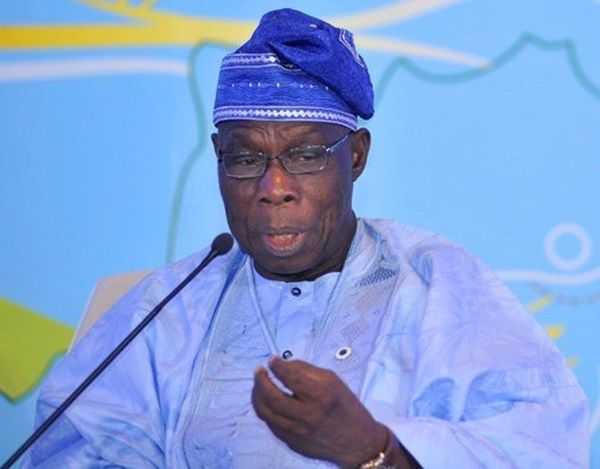Former Nigerian President, Olusegun Obasanjo and Former Ugandan Vice President, Speciosa Wandira-Kazibwe are calling on African countries to sustain the “radical agility” of Africa’s Multilateralism in the face of a global pandemic (COVID-19) which threatened to disrupt Africa’s biggest multilateral endeavour in half a century – the Africa Continental Free Trade Agreement (AfCFTA).
In an article published on TheAfricaReport.com, the two very influential voices in African political affairs called into question the logic behind border closures and travel bans against some African countries over a disease which is not yet known to have originated in Africa, and as new data suggests, was possibly in circulation in the West long before it’s the discovery by South African Scientists.
In what appears to be the strongest criticism of the controversial travel policy approach by the West to curbing the spread of the Omicron variant, the former African heads of state believe that the posture of the West reflects the old and crippled multilateralism which “has frozen attempts to reform global trade to serve the people rather than corporations.”
Many important questions remain unanswered about the swift travel bans imposed on African countries following South Africa’s announcement in November of its discovery of the new B.1.1.529 variant of COVID 19 – subsequently labelled as Omicron by the World Health Organisation.
The first country to flag the variant through its world-class genomics facilities, South Africa probably expected the announcement to have been heralded as an important milestone in the global effort at tracking the evolution of the disease. Instead, it triggered a frenzy of panicky and selective border closures against African countries, which at best could be described as punitive, incoherent and counter-productive.
The global community will learn later that this new variant had been in circulation for at least a month prior to its discovery.
As of 8 December, 42 countries in all 6 WHO regions had recorded the variant with several more countries reporting sustained community spread.
A mapping tool developed by travel website Skyscanner shows that as at December 10, at least 96 ‘major restrictions’ which were imposed on South Africa, were still in place. This is up from around 60 significant restrictions in mid-2021. The travel ban has since been expanded to include other African countries such as Nigeria, Namibia, Zimbabwe, Botswana, Lesotho, Eswatini, Angola, Mozambique, Malawi and Zambia.
Omicron has since the ban, been identified in many other countries around the world, including the United States. Some data even suggests that it may have been circulating in Europe even before it was identified in southern Africa. Yet the bans remain.
The data remains nuanced on whether the ban has really delayed the arrival and spread of the new variant in the United States and Europe, and, how it impact the efforts to control Covid-19.
The questions posed by Obasanjo and Speciosa about the message being conveyed through such travel bans deserve particular attention; “that each country by unilaterally bolting its gates will be able to hold back the tide of a pandemic, alone? That contributing to our global understanding of the evolution of a world plague, by sharing the fruits of years of genomic capabilities development, should lead to a country being ostracised…”
As an African journalist myself, I take exceptional consolation in the alternatives proposed by the two eminent Africans, and even more so, in the pragmatic programs being undertaken in Africa by Africans themselves, to safeguard human lives, sustain economic growth, and forge a science-driven approach to curbing the impact of the pandemic.
According to the authors, “through a combination of skillful compromises and modern technologies, African countries pressed on and ensured that the timeline for start of trading would be maintained. It was as clear as noonday to those of us championing African multilateralism that retreating behind the walls of nationalist survival would be continental suicide.”
This is also felt in being the first continent to agree on a common digital platform for biosurveillance and biosecurity.
African Union institutions also embarked on initiatives such as PanaBIOS, PanaCode, Trusted Travel, Trusted Vaccines, AMSP “allowing the continent to pool resources to procure medical essentials; and for test results and vaccine records across the continent to be shared so that travellers can be securely screened for COVID-19 at borders across the continent,”
In the face of the new Omicron treat, it is critical that African countries champion these homegrown solutions. African political leaders must show real leadership by activating these innovative defense mechanisms and accelerate their deployment.
The two dignitaries opine: “Take omicron, for instance, it is still detected in PCR tests. Its effects are likely to be attenuable by vaccines. We can sequence it in hours in many labs across Africa. There is no reason why a traveller from Togo to Namibia should automatically carry omicron along when their test and vaccine records can be digitally shared ahead of time with the destination country authorities and gene sequencing procedures activated based on AI algorithms for risk monitoring.”
I can only agree with the authors that there is now adequate infrastructure to make the fight a reality.
“In fact, with the infrastructure African technologists have built under the auspices of the Africa CDC during this pandemic with the support of organisations like the UNDP, AfroChampions, African Society of Laboratory Medicine, Afenet, Econet, Koldchain, PanaBIOS and the African Organisation of Standardisation, this will become a walk in the park.”
The free-trade area recently launched a Caravan platform that provides an “AfCFTA number” to the continent’s small business and offers regional digital trading rails to both government and industry.
“Working together with Afreximbank, the Secretariat is unifying regional payments infrastructure and creating linkages between gender and youth empowerment and industrialization.
The authors describe these interventions as smart multilateralism at work.
It is a bit sad that Africans don’t seem to be reveling enough in being “the first continent to agree on a common digital platform for biosurveillance and biosecurity.” But we absolutely must be confident when we come up with superior solutions to global problems to trumpet them and push for their acceptance.
For a continent like ours that has long been marginalised in the global scheme of things, smart multilateralism is the way to go. It remains not only an alternative for African countries but more importantly, an imperative for the world at large in the pursuit of the universal dividends of globalisation; a safer, freer and more just world.















